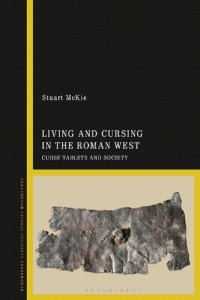
Ebook: Living and Cursing in the Roman West: Curse Tablets and Society
Author: Stuart McKie
- Year: 2022
- Publisher: Bloomsbury Academic
- Language: English
- pdf
Focusing on the Roman west, this book examines the rituals of cursing, their cultural contexts, and their impact on the lives of those who practised them. A huge number of Roman curse tablets have been discovered, showing their importance for helping ancient people to cope with various aspects of life. Curse tablets have been relatively neglected by archaeologists and historians. This study not only encourages greater understanding of the individual practice of curse rituals but also reveals how these objects can inform ongoing debates surrounding power, agency and social relationships in the Roman provinces.
McKie uses new theoretical models to examine the curse tablets and focuses particularly on the concept of ‘lived religion’. This framework reconfigures our understanding of religious and magical practices, allowing much greater appreciation of them as creative processes. Our awareness of the lived experiences of individuals is also encouraged by the application of theoretical approaches from sensory and material turns and through the consideration of comparable ritual practices in modern social contexts. These stimulate new questions of the ancient evidence, especially regarding the motives and motivations behind the curses.
The huge number of curses found in the Roman world shows that their use was an important method for ancient people to cope with life. Curses could address a variety of personal issues, including sexual relationships, crime and legal trials. This book firmly embeds the rituals of cursing into the social contexts in which they were practiced and explores their impact on the lives of those who practiced them.
To achieve this aim, this book examines curse tablets through the lens of several exciting new theoretical models and discussions, in particular the idea of ‘lived religion.’ This reconfigures our understandings of religious and magical practices, to allow a much greater appreciation of them as creative processes. Alongside lived religion, this book also applies theoretical approaches from the sensory and material turns, which also seek to advance understandings of an individual’s lived experience.
This book looks at similar ritual practices in modern social contexts that have been observed by anthropologists and ethnographers and uses them to ask new questions of the ancient evidence, particularly regarding the motives and motivations behind the curses. By thinking in these new ways, this book moves the scholarly discussions on curse tablets beyond the preoccupations about categorization. It also brings curse tablets into contact with ongoing scholarly discussions about materiality and agency in the Roman provinces and shows that these objects have great potential for informing these debates.
McKie uses new theoretical models to examine the curse tablets and focuses particularly on the concept of ‘lived religion’. This framework reconfigures our understanding of religious and magical practices, allowing much greater appreciation of them as creative processes. Our awareness of the lived experiences of individuals is also encouraged by the application of theoretical approaches from sensory and material turns and through the consideration of comparable ritual practices in modern social contexts. These stimulate new questions of the ancient evidence, especially regarding the motives and motivations behind the curses.
The huge number of curses found in the Roman world shows that their use was an important method for ancient people to cope with life. Curses could address a variety of personal issues, including sexual relationships, crime and legal trials. This book firmly embeds the rituals of cursing into the social contexts in which they were practiced and explores their impact on the lives of those who practiced them.
To achieve this aim, this book examines curse tablets through the lens of several exciting new theoretical models and discussions, in particular the idea of ‘lived religion.’ This reconfigures our understandings of religious and magical practices, to allow a much greater appreciation of them as creative processes. Alongside lived religion, this book also applies theoretical approaches from the sensory and material turns, which also seek to advance understandings of an individual’s lived experience.
This book looks at similar ritual practices in modern social contexts that have been observed by anthropologists and ethnographers and uses them to ask new questions of the ancient evidence, particularly regarding the motives and motivations behind the curses. By thinking in these new ways, this book moves the scholarly discussions on curse tablets beyond the preoccupations about categorization. It also brings curse tablets into contact with ongoing scholarly discussions about materiality and agency in the Roman provinces and shows that these objects have great potential for informing these debates.
Download the book Living and Cursing in the Roman West: Curse Tablets and Society for free or read online
Continue reading on any device:

Last viewed books
Related books
{related-news}
Comments (0)